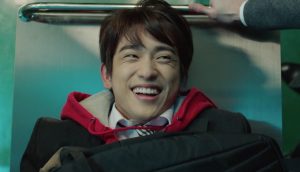
In the same way that K-pop songs repeat successful hooks and structures to craft the perfect earworm, K-dramas are notorious for reusing cliches. Sometimes this can feel uninspired, but in the case of He Is Psychometric, the show uses common tropes to craft a funny, sweet and satisfying story about vulnerability being the key to overcoming the pain of the past.
This review contains spoilers from the drama.
He Is Psychometric is based around the supernatural powers of orphan Lee Ahn (Got7’s Jinyoung). His psychometric skills are defined in the show’s opening credits as the “ability to measure and interpret the essence or history of a person or thing through touch.” By touching people and objects, Ahn is able to see the strongest memories tied to them, which are often painful. As he explains to Yoon Jae-in (Shin Ye-eun), bad memories are more vividly stored in our brains than happy ones.
While Ahn can see everyone’s true emotions, his stoic adoptive older brother Kang Seung-mo (Kim Kwon) can’t understand or express any emotions due to a condition called alexithymia. Seung-mo is a “daddy long legs” to Jae-in, meaning he has been her secret benefactor paying for her school. She begins the series vacillating between being stoic and calm and overwhelmed and hyperventilating. She lives her life in fear that people will discover her father was convicted of starting a deadly fire that killed Ahn’s parents, though she believes he’s innocent.

Ironically, Ahn and those around him are all running away from their terrible pasts, but his power eventually forces them all to confront their actions and emotions. A thread that runs throughout the show is an adage from Jae-in’s father: Leaving a small wound untreated can get infected and end up killing you. This plays out literally and metaphorically in the lives of the characters who must reveal the truth as well as ask others for help in order to overcome their demons.
The show relies on a few repeated symbols such as cages and chains to illustrate the grip of the past. As its revealed in later episodes, Seung-mo and his mother were locked up in a basement for nine years with chains around their ankles that dug into their skin and left scars. Their cruel captor, Kang Geun-taek (Lee Seung-joon), also has scars around his neck from being chained up as a child victim of human trafficking.
“What’s the point of breaking off the chain when all this is still grasping onto Seong-mo’s ankle?” asks Seong-mo’s long-suffering friend, detective Eun Ji-soo (Sistar’s Dasom), illustrating that emotional scars remain even when the danger has passed.

Jae-in also has something clawing at her ankle throughout the series — the painful happy memories of her father before the fire. One of her strongest memories is of her yellow Converse coming untied and her father stooping down to tie them. When her father is arrested and imprisoned, he’s no longer there to tie her shoes and they constantly trip her up. She falls outside the police station as a girl. Then later she falls in the rain because her left shoe was untied and it slipped off. Ahn had just learned her father’s identity, and her past troubles literally came back to trip her up again.
Her opening up to Ahn is also illustrated through her shoe. They share their first kiss after she allows him to bend down and tie her shoe for her, sweetly showing that she was willing to share her burden with him and allow him to access her precious memories.
Ahn also has a physical marker of his internal transformation. Before working to hone his powers with Jae-in, he’s always wearing overly long-sleeved shirts and hoodies, which he can use to cover his hands while moving through the world. This protects him from coming in contact with any people or objects. With Jae-in’s help, Ahn is able to come out of his sweatshirt cocoon and develop a different perspective toward his abilities.

Conversely, Seung-mo never relies on anyone else, and for good reason: The police did nothing to capture he and his mother’s kidnapper, who continued to stalk and torment them. But Seung-mo’s lack of trust in anyone means he bears the burden of his pain alone and his anger toward Kang Geun-taek goes unchecked, festering into murderous rage. Seung-mo predicts his own fate when he says, “A person who fights with a monster should be careful that they don’t turn into a monster during the fight.”
The show’s structure is effectively built to allow its characters to grow in realistic ways over the course of 16 episodes.
It initially starts with Jae-in and Ahn meeting in high school. After three episodes, the action jumps forward two years, with Jae-in attempting to find justice on the inside by becoming a police officer and Ahn still struggling to focus his abilities in order to work with Ji-soo in the Special Investigation Unit. Apart, they’ve made little progress on their own.
Despite having a supernatural ability, Ahn is still a goofy, driftless 20-something who gets Korean words mixed up, sings along to Twice’s “TT” in the car and is unable to live up to his potential. His sweetness and emotional sensitivity provide a foil for the clever but emotionally closed off Jae-in, who is so focused on the past that she can’t see her future. Together they undergo a believable arc of change and maturing.

Every “side quest” so to speak to the main drama has a point, developing Ahn and Jae-in’s relationship or getting them one step closer to the truth. Even their relationships with their best friends reinforce the drama’s overarching themes.
Despite having a companion in his older brother Seung-mo, Ahn is revealed in flashbacks to have been an angry, isolated teen until accidentally touching bullied rich kid Dae-bong (Noh Jong-hyun) and learning his father physically abuses him. It’s one of the first times that Ahn’s visions don’t make him revile the person whose memories he’s seen. Instead, he learns there’s a benefit of looking past the surface. It leads him to a true friend, which is a gift.
Jae-in’s best friend So-hyun (Goo Yoon-jung) is an example of overcoming the sins of your parents. She used to live in the same neighborhood as Jae-in but her father was part of a group that forced them out because of their association with a criminal. The friends reconnect in high school, with So-hyun choosing to see Jae-in separately from her father’s crimes. Jae-in in return offers zero judgment when So-hyun confides she is pregnant and decides to become a teen single mother.

The drama does have a couple not-so-ideal relationships, especially since they’re meant to be perceived as sweet. Dae-bong has an obsessive crush on So-hyun for years that makes her uncomfortable and isn’t based on anything other than her being pretty. Considering this drama is all about the devastating effects of obsession, it’s troubling that Dae-bong is portrayed first as harmless and later as the perfect match for So-hyun because he is so devoted to her and her daughter. It’s plot lines like these that teach men that if “nice” guys hold out long enough, they’ll eventually wear a woman down with their unwanted advances.
Another frustrating relationship is that between Seung-mo and his friend Ji-soo. Much like Jinyoung, Dasom is a solid idol-turned-actor, but this role gives her little to do. Her character is not-so-secretly in unrequited love with Seung-mo for … no reason? Their relationship is extremely one-sided, with her being there for him but never vice versa. Ji-soo is a stereotypical exasperated woman who futility pushes all the flawed men in her life, including Ahn and her father, the police commissioner who is hiding the truth about the apartment fire all those years ago.
She has no real motivations of her own, except for an unfortunately underdeveloped friendship with forensic pathologist Dr. Hong. And what does she get for all her serving men’s storylines? Mistreatment and then an untimely death. Yes, like many, many women in dramas, superhero movies and comics, Ji-soo gets “fridged,” a trope in which the love interest of the hero dies to further that man’s motivations and story. And her death is a three-for-one, causing all the men in her life — Seung-mo, Ahn and her father — to finally get their acts together.

Her death is extra insulting because she’s murdered by being stabbed by Geun-taek, who knows just where to jab a knife to kill. Except Geun-taek stabbed Ahn earlier in the series and he managed to not only walk away from the attack but also bounced back to normal after a few hours in the hospital. Simply put, her storyline was a lazy narrative device.
The drama’s plot gets a bit too convoluted the more Seung-mo’s hidden past, crimes and motivations become clear. His plan is like the Rubik’s cube his other grave him — he’s strategizing over all six sides at once. Not every decision he makes totally adds up at the end but this keeps the mystery and action thrilling. Plus, the “what” ultimately matters less than the “why” characters do what they do and the lessons they learn.
Despite its familiar formula, He Is Psychometric doesn’t end with a happily ever after for everyone, but it does offer a sense of closure. A one-year later flash-forward wraps up all the story lines nicely, with characters who’ve learned to open up finding happiness, while characters who had their sins brought to light find peace even in punishment.
In episode five, Ahn says of his powers: “People’s memories are like a jumbled up pillbox, so I won’t know unless I take it to know if it’s poison or the antidote.” He Is Psychometric shows that even if it’s bitter and painful, opening up about your weaknesses to others is a cure that will make you stronger.
(Translations via Viki. Images via TVN.)


